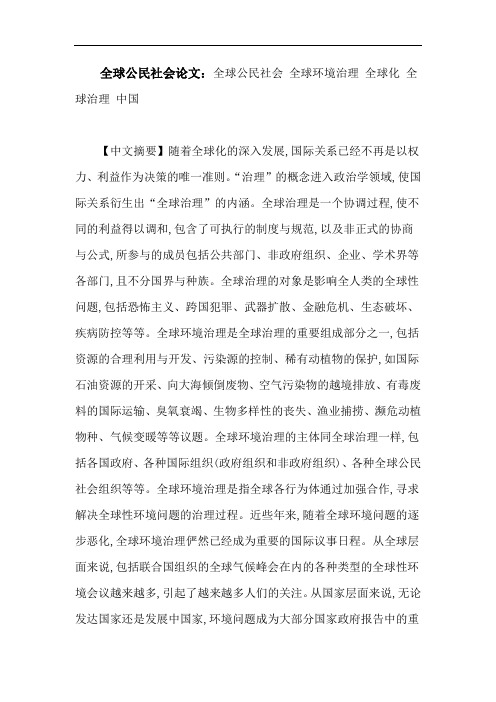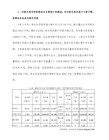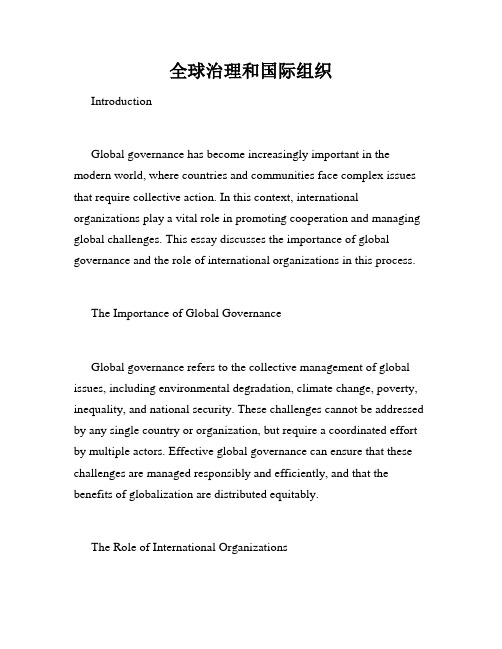Globalization, Global Governance and European Experience
globalization英文作文

globalization英文作文下载温馨提示:该文档是我店铺精心编制而成,希望大家下载以后,能够帮助大家解决实际的问题。
文档下载后可定制随意修改,请根据实际需要进行相应的调整和使用,谢谢!并且,本店铺为大家提供各种各样类型的实用资料,如教育随笔、日记赏析、句子摘抄、古诗大全、经典美文、话题作文、工作总结、词语解析、文案摘录、其他资料等等,如想了解不同资料格式和写法,敬请关注!Download tips: This document is carefully compiled by theeditor. I hope that after you download them,they can help yousolve practical problems. The document can be customized andmodified after downloading,please adjust and use it according toactual needs, thank you!In addition, our shop provides you with various types ofpractical materials,such as educational essays, diaryappreciation,sentence excerpts,ancient poems,classic articles,topic composition,work summary,word parsing,copyexcerpts,other materials and so on,want to know different data formats andwriting methods,please pay attention!Globalization is a phenomenon that has greatly influenced our world. It has brought many changes and challenges to various aspects of our lives. For instance, in terms of economy, globalization has led to the integration of markets and the expansion of multinational corporations. This has resulted in increased competition and opportunities for businesses to grow and expand globally.In addition to the economic impact, globalization has also affected culture and society. With the advancement of technology and communication, people from different parts of the world can now easily connect and interact with each other. This has led to the exchange of ideas, values, and traditions, making our world more diverse and interconnected.Furthermore, globalization has also had a significant impact on the environment. The increased movement of goodsand services across borders has led to a rise in transportation and energy consumption, contributing to environmental issues such as air pollution and climate change. However, globalization has also provided opportunities for global collaboration and the sharing of knowledge and resources to address these environmental challenges.Moreover, globalization has also influenced politics and governance. It has led to the formation ofinternational organizations and agreements, such as the United Nations and the World Trade Organization, which aim to promote cooperation and resolve global issues. However, globalization has also raised concerns about sovereignty and the loss of control over domestic policies anddecision-making.In conclusion, globalization has brought about significant changes in various aspects of our lives. It has impacted the economy, culture, environment, and politics. While it has provided opportunities for growth and collaboration, it has also presented challenges and raisedconcerns. It is important for us to understand and adapt to the effects of globalization in order to navigate the complexities of our interconnected world.。
台湾大学人文地理学试题

一、试论当代人文地理学者如何透过(1)性别(2)阶级(3)族裔(ethnicity)(4)性倾向(sexual orientation)等概念来探讨社会分化与空间分化之关连。
请择其一说明之。
二、「全球化(globalization)」与「全球环境变迁(global change)」分别是主导当代人文社会科学、以及环境与地球科学学术议程的重要发展脉络,试问地理学的学术研究版图(research landscapes)在研究议题、在理论与方法论上如何回应此攸关社会经济与环境之全球性的变迁趋势?三、试论运用「模式」进行地理学研究的优势与限制。
四、请就所知说明非线性现象在自然地理方面的例子。
可以从混沌、复杂现象谈起。
也可以讨论实证论在自然地理研究方面的优点和限制。
五、In this department as well as in most geography departments in the U.S. And Europe, GIS (geographic information system) students are required to take the History and Philosophy of Geography courses? State your reasons to either support or oppose this course requirement.在本系以及美国和欧洲的大部分地理系,GIS(地理信息系统)专业的学生都必须参加历史和地理哲学课程?试以支持或反对参加这门课程要求的态度,说明你的理由。
1、试论文化转向(cultural turn)与新文化地理学(new cultural geography)的发展如何让人文地理研究者重新省思当今全球化空间尺度的生产与运作?2、何谓族群?人与社会地理学在族群的研究有哪些议题?试以其中一个族群为主题(例如老人或妇女或特定族裔…)提出你的研究概念内涵、相关理论以及地理意涵。
globalization 英语作文

Globalization has become a defining feature of the modern world,influencing every aspect of our lives from the economy to culture.Here is a detailed essay on the topic of globalization:Title:The Impact of GlobalizationIntroduction:Globalization refers to the process of increased interconnectedness and interdependence among countries.It is characterized by the free flow of goods,services,capital,and labor across borders.The advent of globalization has been facilitated by technological advancements,particularly in communication and transportation.Economic Benefits:1.Increased Trade:Globalization has led to the expansion of international trade. Countries can now export and import goods and services more efficiently,leading to economic growth and job creation.2.Access to Resources:Businesses can access a wider range of resources,including raw materials and labor,which can be obtained at competitive prices.3.Market Expansion:Companies can expand their markets beyond national borders, reaching a global customer base and increasing their potential for profit.Cultural Exchange:1.Diversity:The exchange of cultures has enriched societies with a variety of foods, music,art,and traditions from around the world.nguage Learning:The need for communication across borders has led to an increased interest in learning foreign languages,promoting linguistic diversity and understanding.cational Opportunities:Students have access to educational institutions and resources from different countries,fostering a more global perspective.Technological Advancements:1.Innovation:Global competition encourages innovation,as companies strive to stay ahead in the market.rmation Access:The internet has made information more accessible than ever before,allowing people to learn about and engage with global issues.Challenges of Globalization:1.Economic Disparity:While some benefit from globalization,others face job losses and economic instability,particularly in industries that cannot compete with cheaper imports.2.Cultural Homogenization:The spread of global brands and media can lead to a loss oflocal culture and identity.3.Environmental Impact:Increased production and transportation contribute to environmental degradation and climate change.Social and Political Implications:1.Migration:Globalization has facilitated the movement of people for work and education,but it also brings challenges related to integration and social cohesion.2.Global Governance:The need for international cooperation has grown,requiring more effective global governance structures to address shared challenges.Conclusion:Globalization is a complex phenomenon with farreaching implications.While it offers numerous opportunities for economic growth and cultural exchange,it also presents significant challenges that must be managed through thoughtful policy and international cooperation.As we move forward,it is essential to balance the benefits of globalization with the need to protect local economies,cultures,and the environment.。
改革开放40年以来翻译

这些翻译表达涵盖了改革开放40年以来中国在经济、贸易、金融以及社会发展,科技创新、教育文化、农业农村发展,业劳动力、城市发展与建设,交通与基础设施、环境保护与可持续发展、文化与教育,医疗与健康、法律与司法、体育与奥运、军事与国防,外交与国际关系、党风廉政与反腐败,城市化与城市发展等领域的进展和改革。
它们在相关的政策文件、新闻报道和学术文献中被广泛使用。
Reform and Opening Up: 改革开放Economic restructuring: 经济重组Market-oriented reforms: 市场化改革Opening up to the outside world: 对外开放Foreign investment: 外资投资Trade liberalization: 贸易自由化Foreign trade: 外贸Foreign direct investment (FDI): 外商直接投资Export-oriented economy: 出口导向型经济Special Economic Zones (SEZs): 经济特区Opening up of the financial sector: 金融业开放State-owned enterprise (SOE) reform: 国有企业改革Private enterprise development: 民营企业发展Market economy: 市场经济Socialism with Chinese characteristics: 中国特色社会主义Poverty alleviation: 扶贫Rural revitalization: 乡村振兴Belt and Road Initiative: 一带一路倡议Technological innovation: 科技创新Sustainable development: 可持续发展经济与金融:State-owned enterprise (SOE) reform: 国有企业改革Mixed ownership reform: 混合所有制改革Financial liberalization: 金融自由化Stock market: 股票市场Bond market: 债券市场Foreign exchange market: 外汇市场Free trade zone: 自由贸易区Capital market: 资本市场Intellectual property rights protection: 知识产权保护Financial deregulation: 金融放松管制贸易与对外关系:31. Free trade: 自由贸易Trade surplus/deficit: 贸易顺差/逆差Bilateral trade: 双边贸易Multilateral trade: 多边贸易Trade barriers: 贸易壁垒Trade imbalance: 贸易不平衡Foreign direct investment (FDI): 外商直接投资Trade cooperation: 贸易合作Export-oriented industries: 出口导向产业Cross-border e-commerce: 跨境电子商务社会发展与改革:Urbanization: 城市化Poverty alleviation: 扶贫Social welfare: 社会福利Healthcare reform: 医疗改革Education reform: 教育改革Environmental protection: 环境保护Rural revitalization: 农村振兴Housing reform: 住房改革Pension system reform: 养老保险制度改革Social security system: 社会保障体系51. Technological advancement: 科技进步Innovation-driven development: 创新驱动发展Research and development (R&D): 研发High-tech industry: 高科技产业Artificial intelligence (AI): 人工智能Internet of Things (IoT): 物联网Big data: 大数据Cloud computing: 云计算Cybersecurity: 网络安全教育与文化:Cultural exchange: 文化交流Cultural diversity: 文化多样性Intangible cultural heritage: 非物质文化遗产Cultural preservation: 文化保护Art education: 艺术教育Cultural tourism: 文化旅游Education reform: 教育改革Lifelong learning: 终身学习Cultural heritage conservation: 文化遗产保护Quality-oriented education: 素质教育Vocational education: 职业教育Cultural exchange: 文化交流Cultural heritage protection: 文化遗产保护Film and television industry: 影视产业Performing arts: 表演艺术Literary works: 文学作品农业与农村发展:Agricultural modernization: 农业现代化Rural revitalization: 乡村振兴Agricultural subsidies: 农业补贴Crop diversification: 作物多样化Organic farming: 有机农业Rural infrastructure: 农村基础设施Farmer cooperatives: 农民合作社Agricultural technology transfer: 农业技术转让Rural poverty alleviation: 农村扶贫Agricultural reforms: 农业改革Agricultural modernization: 农业现代化Agricultural reform: 农村改革Agricultural technology: 农业技术Agricultural sustainability: 农业可持续发展Rural entrepreneurship: 农村创业Farmer's income: 农民收入Agricultural cooperation: 农业合作就业与劳动力:Employment opportunities: 就业机会Labor market: 劳动力市场Job creation: 就业创造Labor rights: 劳工权益Wage reform: 工资改革Labor mobility: 劳动力流动性Unemployment rate: 失业率Labor union: 工会Labor protection: 劳动保护Work-life balance: 工作与生活平衡城市发展与建设:Urban renewal: 城市更新Urban planning: 城市规划Sustainable urbanization: 可持续城市化Smart cities: 智慧城市Urban infrastructure: 城市基础设施Urban transportation: 城市交通Urban pollution control: 城市污染控制Urbanization rate: 城镇化率Urban-rural integration: 城乡一体化Livable cities: 宜居城市交通与基础设施:High-speed rail: 高速铁路Expressways: 高速公路Airport expansion: 机场扩建Port development: 港口发展Infrastructure investment: 基础设施投资Public transportation: 公共交通Logistics network: 物流网络Rail transit: 轨道交通Bridge construction: 桥梁建设Urban transport planning: 城市交通规划环境保护与可持续发展:Green development: 绿色发展Renewable energy: 可再生能源Carbon emissions reduction: 减排Eco-friendly practices: 环保实践Biodiversity conservation: 生物多样性保护Waste management: 废物管理Clean energy technology: 清洁能源技术Sustainable agriculture: 可持续农业Environmental regulations: 环境法规Climate change mitigation: 气候变化缓解社会治理与法律改革:Rule of law: 法治Judicial reform: 司法改革Anti-corruption campaign: 反腐败运动Legal system reform: 法制改革Social stability: 社会稳定Public security: 公共安全Community governance: 社区治理Crime prevention: 犯罪预防Human rights protection: 人权保护Legal education: 法律教育社会福利与保障:Social insurance: 社会保险Healthcare coverage: 医疗保障Pension system: 养老保险制度Poverty alleviation program: 扶贫计划Social assistance: 社会救助Disability support: 残疾人扶助Childcare services: 儿童保育服务Elderly care: 老年人护理Housing subsidies: 住房补贴Family planning policy: 计划生育政策科学与教育:Scientific research: 科学研究Higher education: 高等教育Scientific achievements: 科研成果Science and technology parks: 科技园区STEM education: 科学、技术、工程、数学教育School curriculum: 学校课程Talent cultivation: 人才培养Academic exchange: 学术交流Digital learning: 数字化学习Education equity: 教育公平性文化与娱乐:Cultural industry: 文化产业Artistic expression: 艺术表达Cultural tourism: 文化旅游Film festival: 电影节Music concert: 音乐会Literary award: 文学奖项Cultural heritage sites: 文化遗产地Performing arts center: 表演艺术中心Art exhibition: 艺术展览Online streaming platform: 在线流媒体平台经济与金融:Market-oriented reforms: 市场化改革Foreign direct investment (FDI): 外商直接投资Economic liberalization: 经济自由化Free trade zone: 自由贸易区Financial reform: 金融改革Stock market: 股票市场Monetary policy: 货币政策Economic globalization: 经济全球化Supply-side reforms: 供给侧改革Consumer market: 消费市场国际合作与外交:Belt and Road Initiative: 一带一路倡议Multilateral cooperation: 多边合作Diplomatic relations: 外交关系International trade: 国际贸易Foreign aid: 外援Cultural diplomacy: 文化外交Global governance: 全球治理Regional integration: 区域一体化International organizations: 国际组织Peacekeeping missions: 维和任务社会变革与社会价值观:Gender equality: 性别平等Family values: 家庭价值观Social equality: 社会平等Human dignity: 人的尊严Social justice: 社会公正Civil society: 公民社会Youth empowerment: 青年赋权Volunteerism: 志愿服务Social inclusion: 社会包容Cultural diversity: 文化多样性人民生活与社会福利:Living standards: 生活水平Social security system: 社会保障体系Health insurance: 医疗保险Education system: 教育体系Housing affordability: 住房可负担性Consumer rights: 消费者权益Social welfare: 社会福利Elderly care services: 老年人护理服务Maternity leave: 产假Cultural activities: 文化活动科技与创新:Technological advancements: 科技进步Innovation-driven development: 创新驱动发展Research and development (R&D): 研发Intellectual property rights: 知识产权Science parks: 科技园区Start-up ecosystem: 创业生态系统High-tech industries: 高科技产业Digital transformation: 数字化转型Artificial intelligence (AI): 人工智能Big data analytics: 大数据分析环境保护与可持续发展:Environmental conservation: 环境保护Sustainable development: 可持续发展Clean energy: 清洁能源Carbon emissions: 碳排放Renewable resources: 可再生资源Ecological restoration: 生态恢复Green technology: 绿色技术Waste management: 废物管理Biodiversity conservation: 生物多样性保护Climate change mitigation: 气候变化缓解城市化与城市发展:Urbanization: 城市化Urban planning: 城市规划Smart cities: 智慧城市Urban infrastructure: 城市基础设施Public transportation: 公共交通Urban renewal: 城市更新Urban design: 城市设计Urban governance: 城市治理Urban development: 城市发展Housing construction: 住房建设医疗与健康:Healthcare reform: 医疗改革Universal health coverage: 全民医保Primary healthcare: 基层医疗Medical research: 医学研究Disease prevention and control: 疾病预防和控制Telemedicine: 远程医疗Health promotion: 健康促进Traditional Chinese medicine: 中医药Public health emergency response: 公共卫生应急响应Health education: 健康教育法律与司法:Rule of law: 法治Judicial reform: 司法改革Legal system: 法律体系Legal rights: 法律权益Legal aid: 法律援助Anti-corruption campaign: 反腐败运动Judicial independence: 司法独立Criminal justice: 刑事司法Civil litigation: 民事诉讼Legal awareness: 法律意识体育与奥运:Sports development: 体育发展Olympic Games: 奥运会Sportsmanship: 体育精神Athlete training: 运动员培训Sports facilities: 体育设施Sports culture: 体育文化Sports diplomacy: 体育外交Fair play: 公平竞争Paralympic Games: 残奥会Sports nutrition: 运动营养军事与国防:National defense: 国防Military modernization: 军事现代化Defense technology: 防务技术Peacekeeping operations: 维和行动National security: 国家安全Defense budget: 国防预算Military strategy: 军事战略Defense industry: 国防工业Cybersecurity: 网络安全Military cooperation: 军事合作经济与贸易:Economic reform: 经济改革Market-oriented economy: 市场经济Foreign direct investment (FDI): 外商直接投资Free trade: 自由贸易Economic globalization: 经济全球化Export-oriented manufacturing: 出口导向型制造业Financial market: 金融市场E-commerce: 电子商务Economic growth: 经济增长Sustainable development: 可持续发展科学与教育:Scientific research: 科学研究Technological innovation: 技术创新STEM education: 科学、技术、工程和数学教育Knowledge-based economy: 知识经济Research institute: 研究所Academic exchange: 学术交流Science and technology policy: 科技政策Intellectual property protection: 知识产权保护Educational reform: 教育改革Lifelong learning: 终身学习社会与人文:Social harmony: 社会和谐Poverty alleviation: 扶贫Social equality: 社会平等Gender equality: 性别平等Social welfare: 社会福利Volunteer work: 志愿者工作Community development: 社区发展Cultural tolerance: 文化包容Ethical values: 道德价值观Social responsibility: 社会责任农业与农村发展:Agricultural modernization: 农业现代化Rural revitalization: 乡村振兴Agricultural productivity: 农业生产力Agricultural subsidies: 农业补贴Rural infrastructure: 农村基础设施Agricultural technology: 农业技术Rural entrepreneurship: 农村创业Agricultural sustainability: 农业可持续性Farmer's income: 农民收入Crop diversification: 农作物多样化交通与基础设施:Transportation network: 交通网络High-speed rail: 高铁Expressway: 高速公路Urban transportation: 城市交通Airport construction: 机场建设Port development: 港口发展Bridge and tunnel: 桥梁和隧道Public transportation system: 公共交通系统Infrastructure investment: 基础设施投资Smart transportation: 智能交通外交与国际关系:Diplomatic relations: 外交关系Bilateral cooperation: 双边合作Multilateral cooperation: 多边合作International trade: 国际贸易Global governance: 全球治理International cooperation: 国际合作Foreign aid: 外援Peacekeeping mission: 维和任务Non-interference policy: 不干涉政策Soft power: 软实力党风廉政与反腐败:Party discipline: 党纪Anti-corruption campaign: 反腐败运动Party building: 党建设Clean governance: 清廉政府Anti-graft measures: 反贪措施Integrity education: 廉政教育Corruption investigation: 腐败调查Asset recovery: 资产追回Whistleblower protection: 举报保护Anti-corruption legislation: 反腐败立法城市化与城市发展:Urbanization: 城市化Urban planning: 城市规划Urban renewal: 城市更新Sustainable urban development: 可持续城市发展Smart city: 智慧城市Urban infrastructure: 城市基础设施Urban transport system: 城市交通系统Urban design: 城市设计Urban environmental protection: 城市环境保护Urban governance: 城市治理环境保护与可持续发展:Environmental protection: 环境保护Pollution control: 污染治理Carbon emissions reduction: 碳排放减少Renewable energy: 可再生能源Ecological conservation: 生态保护Biodiversity preservation: 生物多样性保护Clean energy development: 清洁能源开发Waste management: 废物处理Green technology: 绿色技术Sustainable development goals: 可持续发展目标科技与创新:Technological advancement: 科技进步Innovation-driven development: 创新驱动发展Research and development: 研发Artificial intelligence: 人工智能Big data: 大数据Internet of Things: 物联网Cloud computing: 云计算Robotics: 机器人技术Quantum computing: 量子计算5G technology: 5G技术社会保障与福利:Social security: 社会保障Pension system: 养老金制度Healthcare reform: 医疗改革Social insurance: 社会保险Poverty alleviation program: 扶贫计划Social assistance: 社会救助Disability rights: 残疾人权益Maternity benefits: 生育津贴Unemployment insurance: 失业保险Housing welfare: 住房福利人民生活水平提高:Standard of living: 生活水平Income inequality: 收入不平等Consumerism: 消费主义Quality of life: 生活质量Education equality: 教育平等Affordable housing: 负担得起的住房Employment opportunities: 就业机会Social mobility: 社会流动性Leisure and entertainment: 休闲与娱乐Consumer rights: 消费者权益法律与知识产权保护:Intellectual property rights: 知识产权Patent protection: 专利保护Copyright infringement: 侵权Trademark registration: 商标注册Anti-counterfeiting measures: 打击假冒行动Cybersecurity: 网络安全Data protection: 数据保护Legal enforcement: 法律执法Anti-corruption campaign: 反腐败斗争Anti-money laundering: 反洗钱。
全球公民社会论文:全球公民社会全球环境治理全球化全球治理中国

全球公民社会论文:全球公民社会全球环境治理全球化全球治理中国【中文摘要】随着全球化的深入发展,国际关系已经不再是以权力、利益作为决策的唯一准则。
“治理”的概念进入政治学领域,使国际关系衍生出“全球治理”的内涵。
全球治理是一个协调过程,使不同的利益得以调和,包含了可执行的制度与规范,以及非正式的协商与公式,所参与的成员包括公共部门、非政府组织、企业、学术界等各部门,且不分国界与种族。
全球治理的对象是影响全人类的全球性问题,包括恐怖主义、跨国犯罪、武器扩散、金融危机、生态破坏、疾病防控等等。
全球环境治理是全球治理的重要组成部分之一,包括资源的合理利用与开发、污染源的控制、稀有动植物的保护,如国际石油资源的开采、向大海倾倒废物、空气污染物的越境排放、有毒废料的国际运输、臭氧衰竭、生物多样性的丧失、渔业捕捞、濒危动植物种、气候变暖等等议题。
全球环境治理的主体同全球治理一样,包括各国政府、各种国际组织(政府组织和非政府组织)、各种全球公民社会组织等等。
全球环境治理是指全球各行为体通过加强合作,寻求解决全球性环境问题的治理过程。
近些年来,随着全球环境问题的逐步恶化,全球环境治理俨然已经成为重要的国际议事日程。
从全球层面来说,包括联合国组织的全球气候峰会在内的各种类型的全球性环境会议越来越多,引起了越来越多人们的关注。
从国家层面来说,无论发达国家还是发展中国家,环境问题成为大部分国家政府报告中的重要内容之一。
全球环境治理不同于其他领域的治理,其本身所具有的非政治性、较少的争议性以及问题的迫切性使得这一治理更有可能获得成效。
但是,国家中心治理模式日益受到这些全球性环境问题的挑战,国家在这一问题上的治理失效越发明显。
面对这种失效,具有独立性、非营利性、专业性等特征的全球公民社会越来越引起众多学者的关注。
全球公民社会的组成相当广泛的,从个人到团体,从专业学术机构到以关注各种议题的非营利性组织。
全球公民社会参与成为全球环境治理的重要组成部分,并发挥着以下一些功能:收集、传播和分析信息;影响议事和决策过程;参与实施进程;评估环境状况和监测环境协定的遵守情况;倡导环境正义。
全球化

总的来看,全球化是一个以经济全球化为核心、包含各国各民族各地区在政治、文化、科技、军事、安全、意识形态、生活方式、价值观念等多层次、多领域的相互联系、影响、制约的多元概念。“全球化”可概括为科技、经济、政治、法治、管理、组织、文化、思想观念、人际交往、国际关系十个方面的全球化。
2.全球化(globalization)是个具有煽动性的词。拥护者憧憬它会给整个世界带来空前的进步和繁荣;批评者断言它会给发展中国家带来贫困、战争甚至文化灭绝。什么是全球化?我们真的在经历空前的全球化?以往的全球化给我们带来过什么?
我们正在经历空前的全球化?
“日不落”帝国时代的全球化比美利坚时代逊色吗?如果麦当劳、肯德基能体现全球化,中餐馆可是在上上个世纪就在世界各地登陆了,如今其普及程度远非美国快餐能比。我怀疑,今天的全球化被迅速膨胀的“新闻界”给夸张了。
眼下的全球化主要是通讯技术的飞速进步引起的,交通技术并没有飞跃的进步。自19世纪后半期到20世纪初,以轮船、铁路、汽车和飞机为代表的交通技术出现了质的飞跃,人员和物资的国际交流呈几何级数增长。那个时候移民是容易的,入境管理并不严格,护照也可有可无。美洲就是在那个时代开始住满移民,中国人就是从那时开始改穿西式服装,改用西式笔墨,扛洋枪、住洋房、用洋火、使洋钉,以及下南洋、闯西洋、赴东洋。
3.刺激追求差异的全球化。全球化导致的“趋同”是浅薄的,全球化导致的“逐异”却是深刻的。追逐不同是全球化时代最深刻的特征。全球化的资本毫无人性可言,它带来激烈的社会变迁,刺激形形色色意识形态的兴起,也必然伴随激烈的社会集团、意识形态乃至民族国家之间的冲突。以往的全球化带来了繁荣和进步,也带来了大革命,带来了国内战争,带来了“世界大战”。
全球治理和国际组织

全球治理和国际组织IntroductionGlobal governance has become increasingly important in the modern world, where countries and communities face complex issues that require collective action. In this context, international organizations play a vital role in promoting cooperation and managing global challenges. This essay discusses the importance of global governance and the role of international organizations in this process.The Importance of Global GovernanceGlobal governance refers to the collective management of global issues, including environmental degradation, climate change, poverty, inequality, and national security. These challenges cannot be addressed by any single country or organization, but require a coordinated effort by multiple actors. Effective global governance can ensure that these challenges are managed responsibly and efficiently, and that the benefits of globalization are distributed equitably.The Role of International OrganizationsInternational organizations (IOs) are an essential component of global governance, providing the platform for cooperation among states and other actors. IOs play multiple roles, including:1. Providing a forum for dialogue and negotiation on global challenges2. Facilitating the development of international norms and standards3. Providing technological and financial support to developing countries4. Coordinating and monitoring international agreements and conventions.Examples of IOs include the United Nations (UN), the World Bank, the International Monetary Fund (IMF), and the World Trade Organization (WTO).The United Nations (UN)The UN is the most prominent and inclusive IO in the world, with membership from almost all nations. The UN operates through various bodies, including the General Assembly, the Security Council, and specialized agencies such as the World Health Organization (WHO)and the United Nations Educational, Scientific and Cultural Organization (UNESCO). The UN has played a critical role in promoting human rights, peacekeeping, environmental protection, and poverty reduction.The World Bank and the International Monetary Fund (IMF)The World Bank and the IMF were established after World War II to promote economic stability and development in developing countries. The World Bank provides financial assistance and technical support for development projects, while the IMF provides loans to countries facing economic crises. These organizations have been criticized for promoting neoliberal policies that prioritize economic growth over social and environmental concerns.The World Trade Organization (WTO)The WTO was established in 1995 to promote free trade and reduce protectionism among member states. The WTO has been instrumental in liberalizing international trade and resolving disputes between member states. However, the organization has been criticized for promoting the interests of large multinational corporations at the expense of smaller, less powerful nations.ConclusionIn conclusion, global governance is crucial in managing global challenges and promoting sustainable development. International organizations play a vital role in providing the platform for cooperation among states and other actors, facilitating the development of international norms and standards, providing technological and financial support to developing countries, and coordinating and monitoring international agreements and conventions. While IOs have made significant contributions to global governance, there is still significant room for improvement in terms of their accountability, effectiveness, and representation of marginalized groups.。
这十年的变化英语作文

The past decade has witnessed an unprecedented level of globalization and connectivity, thanks to advancements in transportation and communication. The rise of social media platforms has connected people from all corners of the globe, enabling the instantaneous spread of information and ideas. This increased connectivity has not only facilitated greater cultural exchange and understanding, but has also fueled global movements and activism, bringing about change on an international scale.
四、Economic Transformations
The global economy has undergone significant transformations over the past decade, shaped by factors such as geopolitical shifts, technological advancements, and changing consumer behaviors. The rise of e-commerce, for instance, has reshaped the retail landscape, leading to the decline of traditional brick-and-mortar stores and the rise of online shopping giants. Similarly, the gig economy has gained prominence, offering flexible work opportunities but also raising questions about job security and labor rights. These economic transformations have brought about both opportunities and challenges for individuals and businesses alike.
- 1、下载文档前请自行甄别文档内容的完整性,平台不提供额外的编辑、内容补充、找答案等附加服务。
- 2、"仅部分预览"的文档,不可在线预览部分如存在完整性等问题,可反馈申请退款(可完整预览的文档不适用该条件!)。
- 3、如文档侵犯您的权益,请联系客服反馈,我们会尽快为您处理(人工客服工作时间:9:00-18:30)。
項目 歲入 歲出
金額 106,300百萬歐元 106,300百萬歐元
歐盟廿五國二○○五年預算 歐盟廿五國二○○五年預算 ○○ (約4.1兆台幣) 4.1兆台幣 兆台幣)
金額 較二○○四年 +11.6% -6.2% +5.5% +11% +3.7% +15.1% -7.4% 百分比 42.6% 36.4% 7.8% 4.5% 5.4% 1.8% 0.73% 100%
GOODS PEOPLE CAPITAL SERVICE INFORMATION
POLITICAL ENTITY
SOVEREIGNTY LAW
CULTURAL IDENTITY
LANGUAGE RELIGION ETHNIC BLOOD ETC.
MEDIA
All traffic tools (ships, trains, planes, etc.) Telegraphs, Telephones, Telex, Fax. Electronic tools
Members of European Parliament, 2004-09 (by country) 2004Member Belgium Czech Denmark Germany Estonia Greece Spain France Ireland Seats 24 24 14 99 6 24 54 78 13 Member Italy Cyprus Latvia Lithuania Luxembourg Hungary Malta Netherlands Austria Seats 77 6 9 13 6 24 5 27 18 Total 730 Member Poland Portugal Slovenia Slovakia Finland Sweden U.K. Seats 53 24 7 14 14 19 78
I. Keep Concepts
Globalization Grouping Regionalization Global Governance
Less or No Frontiers
Frontiers
Market Political Entity Cultural Identity
MARKET
Pre-modern colonial imperialism: PrePortugal, Spain Modern colonial imperialism: Netherlands, Britain, France Latecomers: USWWII
Globalization, Global Governance and European Experience
Hungdah Su
Outlines
I. II. III. IV. V.
Keep Concepts Development Today’ Today’s World EU Experience Conclusion
Members of European Parliament, 2004-09 (by Political Groups) 2004Political Parties Group of the European People's Party (Christian Democrats) and European Democrats Socialist Group in the European Parliament Group of the Alliance of Liberals and Democrats for Europe Group of the Greens/European Free Alliance Confederal Group of the European United Left - Nordic Green Left Independence/Democracy Group Union for Europe of the Nations Group Non-attached Members Total Seats 266 201 89 42 41 35 27 29 730
2. The Council
Member States Germany UK France Italy Spain Poland Netherlands Greece Belgium QMV 29 29 29 29 27 27 13 12 12 Member States Portugal Czech Hungary Sweden Austria Denmark Finland Ireland Slovakia QMV 12 12 12 10 10 7 7 7 7 Member States Luxembourg Lithuania Latvia Slovenia Estonia Cyprus Malta Total Minimum QMV 4 7 4 4 4 4 3 321 232
Globalization periods
Victory and expansion of the Western bloc Collapse of two other blocs
-
-
Third World (China, India, Brazil, Indonesia, etc.) Communist bloc
* Only the unemployment rate in towns and cities. Main Source: http://europa.eu.int/comm/publications/booklets/eu_glance/14/txt_en.pdf;
-
The Votes (25 /+1) - The Market / Trade - The Global Governance - The Cultural Influence - The Alternative to the US - The Alternative to the nationalism
4. EU Mechanism
1. A General Picture Three Pillars i. Community ii. CSFP iii. JHA
- General Division of Work
Commission + Council: Managerial Commission + Council + EP: Legislative + Administrative European Court of Justice: Judicial European Council: Guideline
US-led Western Grouping USThree blocs: North America (US), Western Europe (France, Germany) Eastern Asia (Japan) Governance tools: IMF - World Bank, GATT, G8
2. EU as a Power
Area Space Population Density GDP/p.c. GDP Unemploy. R Exports % Imports % EU 25 3,872 th. Km 453.7 million 117.5 h/km2 22300 9900 bn 8.30% 19+ 18+ USA 9,159 th. Km 290.3 million 28.1 h/km2 33600 9,740 bn 4.80% 16 21 Japan 377 Th km 127 million 333.3 h/km2 24800 3,359 bn 5% 9 6 China 9,327 th. Km 1.28 billion 128.9 h/km2 3900 1,400 bn 5%* 9+ 8+ Taiwan 36 th. km 23 million 640 h/km2 13000 269 bn 4%
歲出項 農業及農業地 區 結構調整 內部政策 對外行動 行政費用 東擴前準備 其它 歲出合計
49,115百萬歐元 32,396百萬歐元 7,923百萬歐元 5,476百萬歐元 6,351百萬歐元 3,287百萬歐元 1,305百萬歐元 106,300百萬歐元 百萬歐元
3. EU Governance Legalization Constitutionalization Generalization PanPanEuropeanization/Globalization Codification
A Global Common Market - Information - Goods - Service - Capital - Persons
Global Governance
Pax Americana NATO UN G7+1 WTO IMF OECD
IV. EU Experience
1. European Union, 2006
GLOBALIZA TION GROUPINGS REGIONALIZ ATION
GLOBAL GOVERNANCE REGIONAL GOVERNANCE
II. Developments
-
Grouping periods 16001600-1945 19451945-1990
Groupings
Regionalization
EEC – EC – EU NAFTA APEC – ASEAN Arab world African Union South Eastern Market CIS Mercosur East Asian Summit
III. Today’s World Today’
i.Roles:
